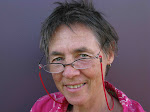
The above art work is by Suzanne Bellamy, Text Box (a pictographic poem), porcelain and oils on wood. Copyright 2011.
Photograph by Susan Hawthorne,© 2011.
Dog three bones hasmoon : crunch time : three bones : dog : has
fence : ( ) : ( ) : centred : crescent moon : howling dogs : throw : is juggled
woman : dilly bag : carries : full moon : fish : swim : encircle : ( )
moon sets : mountain : path : sees / follows : crunch time : comes
Word by word translationdog three bones has
moon time crunch time is
(what) is thrown is juggled; dogs howl (under the moon)
crescent moon centred fence (is)
fish swim (and?) encircle full moon
woman dilly bag carries
crunch time comes
she (?)the mountain path sees/ follows : moon sets
Developed translationdog has three bones
in the crunch time is moon time
dogs howl under the moon in transit
juggling time
above the fence the crescent moon rises centred
fish swim encircling the reflected full moon
a woman in transit carries a dilly bag
she follows the mountain path
the moon sets
crunch times comes
Discussion of grammatical formsmoon (nominative): crunch time (locative absolute) : three bones (accusative plural) : dog (nominative) : has (verb indicative)
fence (locative – above surmised) : ( ? ) : ( ? ) : centred (gerund, completed action) : crescent moon (nominative bahuvrihi compound) : howling dogs (dual nominative with adjectival compound) : throw (idiom: time and throw are used interchangeably) : is juggled (passive)
woman (nominative) : dilly bag (accusative) : carries (indicative – note parallel structure to first sentence) : full moon (accusative) : fish (nominative plural) : swim (indicative) : encircle (gerund) : ( ) (surmised: reflection of moon on water)
moon (nominative) sets (indicative) : mountain (adjectival form, accusative) : path (accusative) : sees / follows (wide semantic arc, can have both meanings) : crunch time (locative absolute) : comes (indicative)
The problematics of translation across species worlds: translating OossAs is clear from this translation there remain many gaps in our understanding of Os (or Ooss). While somewhat ossified, the language does have some transparency and a number of difficulties. The first thing to say is that the language while partially pictographic has a number of indicators for complex tenses and verb structures. Like other ancient languages it has three persons: singular, dual and plural. One strange element is that only the feminine gender is found (with a few archaic terms in neuter).
This short poetic fragment is suggestive of ritual time in which the behaviour of dogs as the keepers of time is unsurprisingly given prominence. The only non-canine actor (the woman) is setting off on a pilgrimage of some sort (crunch time?)
The difficulty with the word reflected is, I surmise, due to the lack of smell in a reflection, so the reflection’s unreality is a conceptual lacuna. If the subject of the woman sentence had been a dog, the wide semantic arc would have extended to the word ‘smells’ as well as ‘sees’ and ‘follows’.
It is clear from the original sentence structure that what is before the snout is of prime importance. Furthermore, the moon, the dogs (three so far) and the woman are in some kind of triangulated relationship with the fish, the sea and the reflected moon. Perhaps one indicates the mundane world, while the other has esoteric meanings. The question is which is which?
The above translation was made while visiting Suzanne Bellamy's Mongarlowe Studio in December 2011.
Japanese
The following translations into Japanese were made by Michelle Kasparian during the lecture I gave at the University of Wollongong today (24 April 2012). Michelle writes:
"Here's the three different ways you can translate the first line of
'Dog Three Bones Has' into Japanese.
"I've put each line into each level of reading in Japanese (Kanji,
Hiragana and Romaji). Romaji is the Japanese words written in English
letters and makes it easier to pronounce/read aloud if the reader
doesn't know Japanese."
I (Susan) am thrilled by these translations and the way in which the translation is a comment on the uncertainty of translation. Translation is an art which has multiple answers.
1. 月にクランシューの時は犬が三つの骨を持っていた。
つきにクランシューのときはいぬがさんつのもっていた。
tsuki ni kuranshuu no toki wa inu ga santsu o motte ita.
2. 月にクランシューの時で、犬は骨が三つを持っていた。
つきにクランシューのときで、いぬがさんつをもっていた。
tsuki ni kuranshuu no toki de, inu ga santsu o motte ita.
3. 月の下でクランシューの時に犬が三つ骨を持っていた。
つきのしたでクランシューのときにいぬがさんつほねをもっていた。
tsuki no shita de kuranshuu no toki ni inu ga santsu hone o motte ita.





